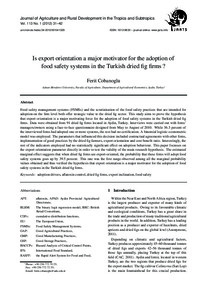Datum
2012Autor
Cobanoglu, FeritSchlagwort
630 Landwirtschaft, VeterinärmedizinMetadata
Zur Langanzeige
Aufsatz

Is export orientation a major motivator for the adoption of food safety systems in the Turkish dried fig firms?
Zusammenfassung
Food safety management systems (FSMSs) and the scrutinisation of the food safety practices that are intended for adoption on the firm level both offer strategic value to the dried fig sector. This study aims to prove the hypothesis that export orientation is a major motivating force for the adoption of food safety systems in the Turkish dried fig firms. Data were obtained from 91 dried fig firms located in Aydin, Turkey. Interviews were carried out with firms’ managers/owners using a face-to-face questionnaire designed from May to August of 2010. While 36.3 percent of the interviewed firms had adopted one or more systems, the rest had no certification. A binomial logistic econometric model was employed. The parameters that influenced this decision included contractual agreements with other firms, implementation of good practices by the dried fig farmers, export orientation and cost-benefit ratio. Interestingly, the rest of the indicators employed had no statistically significant effect on adoption behaviour. This paper focusses on the export orientation parameter directly in order to test the validity of the main research hypothesis. The estimated marginal effect suggests that when dried fig firms are export-oriented, the probability that these firms will adopt food safety systems goes up by 39.5 percent. This rate was the first range observed among all the marginal probability values obtained and thus verified the hypothesis that export orientation is a major motivator for the adoption of food safety systems in the Turkish dried fig firms.
Zitierform
In: Journal of Agriculture and Rural Development in the Tropics and Subtropics. Kassel : Kassel University Press. - Vol. 113, No. 1 (2012), S. 31-42Sammlung(en)
Vol 113, No 1 (2012) (Journal of Agriculture and Rural Development in the Tropics and Subtropics (JARTS))Zitieren
@article{urn:nbn:de:hebis:34-2012061541329,
author={Cobanoglu, Ferit},
title={Is export orientation a major motivator for the adoption of food safety systems in the Turkish dried fig firms?},
year={2012}
}
0500 Oax 0501 Text $btxt$2rdacontent 0502 Computermedien $bc$2rdacarrier 1100 2012$n2012 1500 1/eng 2050 ##0##urn:nbn:de:hebis:34-2012061541329 3000 Cobanoglu, Ferit 4000 Is export orientation a major motivator for the adoption of food safety systems in the Turkish dried fig firms? / Cobanoglu, Ferit 4030 4060 Online-Ressource 4085 ##0##=u http://nbn-resolving.de/urn:nbn:de:hebis:34-2012061541329=x R 4204 \$dAufsatz 4170 7136 ##0##urn:nbn:de:hebis:34-2012061541329
<resource xsi:schemaLocation="http://datacite.org/schema/kernel-2.2 http://schema.datacite.org/meta/kernel-2.2/metadata.xsd"> 2012-09-24T11:17:45Z 2012-09-24T11:17:45Z 2012 1612-9830 urn:nbn:de:hebis:34-2012061541329 http://hdl.handle.net/123456789/2012061541329 eng Kassel University Press Urheberrechtlich geschützt https://rightsstatements.org/page/InC/1.0/ adoption drivers aflatoxin control dried fig firms export inclination food safety 630 Is export orientation a major motivator for the adoption of food safety systems in the Turkish dried fig firms? Aufsatz Food safety management systems (FSMSs) and the scrutinisation of the food safety practices that are intended for adoption on the firm level both offer strategic value to the dried fig sector. This study aims to prove the hypothesis that export orientation is a major motivating force for the adoption of food safety systems in the Turkish dried fig firms. Data were obtained from 91 dried fig firms located in Aydin, Turkey. Interviews were carried out with firms’ managers/owners using a face-to-face questionnaire designed from May to August of 2010. While 36.3 percent of the interviewed firms had adopted one or more systems, the rest had no certification. A binomial logistic econometric model was employed. The parameters that influenced this decision included contractual agreements with other firms, implementation of good practices by the dried fig farmers, export orientation and cost-benefit ratio. Interestingly, the rest of the indicators employed had no statistically significant effect on adoption behaviour. This paper focusses on the export orientation parameter directly in order to test the validity of the main research hypothesis. The estimated marginal effect suggests that when dried fig firms are export-oriented, the probability that these firms will adopt food safety systems goes up by 39.5 percent. This rate was the first range observed among all the marginal probability values obtained and thus verified the hypothesis that export orientation is a major motivator for the adoption of food safety systems in the Turkish dried fig firms. open access In: Journal of Agriculture and Rural Development in the Tropics and Subtropics. Kassel : Kassel University Press. - Vol. 113, No. 1 (2012), S. 31-42 Cobanoglu, Ferit Gedruckte Ausg. im Verlag Kassel Univ. Press (www.upress.uni-kassel.de) erschienen. </resource>
Die folgenden Lizenzbestimmungen sind mit dieser Ressource verbunden:
Urheberrechtlich geschützt

